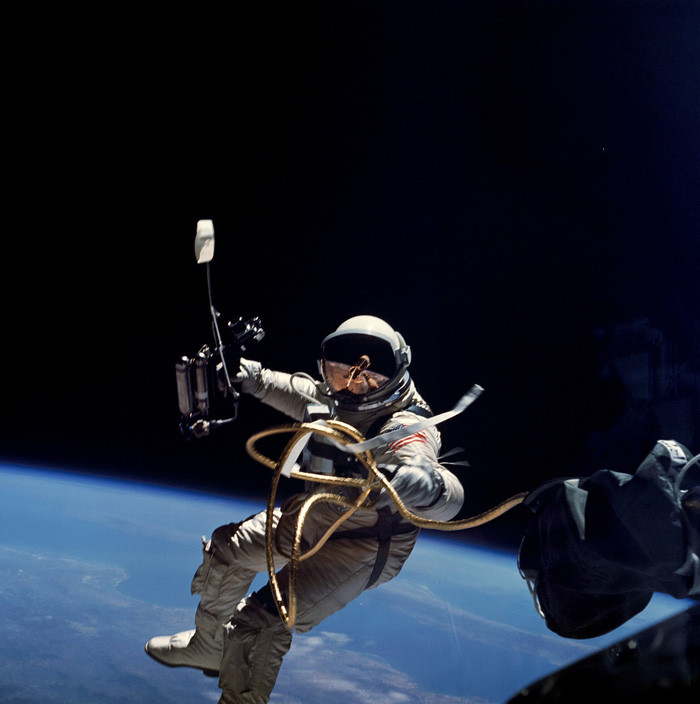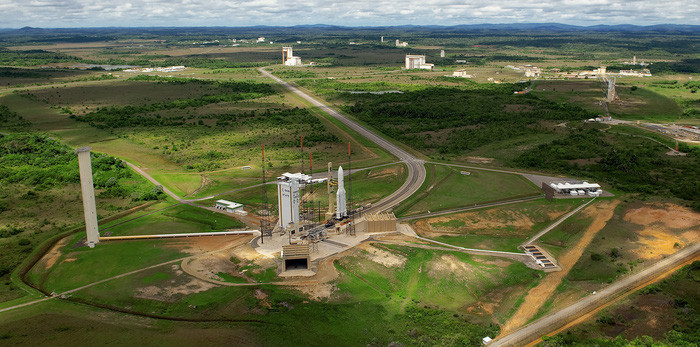The world has some space agencies, do you know?
Referring to the missions of space exploration, NASA is undoubtedly the first name to appear in our heads. Who else besides them?
NASA (US Aeronautics and Space Agency)
This is probably the largest and most famous space agency in the world.
In 1958, US President Eisenhower founded NASA and aimed for civilian purposes in space science, while not being inferior to the then great Soviet rival.
With strong financial potential, most space exploration missions have been undertaken by NASA.

Ed White was the first American to walk in space in 1965 - (Photo: NASA).
Some of the famous missions include the moon landing in Apollo (1961-1972), Mercury (1959-1963), Gemini (1961-1966), space station. Skylab (1965-1979) - the first space station built independently by the United States, and the space shuttle program (1972 - 2011) .
NASA specializes in focusing on understanding the Earth through the most advanced Earth observation systems.
At the same time, NASA studied the sun and planets with specialized satellites like Juno flying around Jupiter, Cassini around Saturn, or Magellan exploring Venus.
In addition, NASA studied solar research, celestial bodies outside the Solar System, and carried out major missions, typically the goal of bringing people to Mars.
ESA (European Space Agency)

Image of Guyane space airport of ESA - one of the most favorable airports in the world - (Photo: ARIANE SPACE).
ESA is an intergovernmental organization established in 1975 to undertake the mission of space exploration of the European Union.
At its inception, ESA often collaborated with NASA in exploration missions to compete with the Soviet space industry.
ESA's initial strategy was to develop the unmanned space industry, but gradually expanded the market and less reliant on NASA.
In the 1990s, with Ariane-4 advanced boosters, ESA became a pioneer in the field of commercial boosters.
ESA currently has 22 member countries and is headquartered in Paris, France. The budget of the ESA in 2017 is estimated at 5.75 billion euros.
ESA currently owns one of the most expensive space airports in the world: Guyane (French: Center Spatial Guyananis) in Kourou in French Guiana.
The airport is often used as a launcher because it is located near the equator, making orbits launch into orbits more precisely and less costly to take advantage of the rotation speed of the Earth.
CSA (Canadian Space Agency)

Scientists examined the Anik A satellite in the early 70s - (Photo: CSA).
It is the agency responsible for Canada's space programs, founded in March 1989, then named the Canada Space Agency (CSA) in October 1990.
Canada has long been known to be one of the first countries to approach aerospace. Specifically, Alouette-1 was born in 1962 as the first satellite in the world not built by two Soviet and American powers.
In addition, Canada's Anik A satellite is also the first domestic satellite in the world.
These successes, along with many other outstanding events, prompted the Canadian government to establish a specialized agency to undertake space research.
JAXA (Japan Aerospace Research and Development Agency)

The H-IIA missile launched in 2014 carries JAXA's Hayabusa-2 - (Photo: AP).
Founded in October 2003, JAXA is an independent agency that functions to research, develop, explore and exploit Japan's cosmic potential.
JAXA takes on the responsibility of researching, developing and launching satellites and studying meteorites.
In July, JAXA's Hayabusa-2 spacecraft will approach the meteor named 1162173 Ryugu, after being launched in 2014 from the Tanegashima Space Center in southern Japan using the H-IIA rocket. This is one of the events of the aerospace industry that was waiting in 2018.
The mission of this spacecraft is to collect soil samples on meteorites and return to Earth in 2020.
RKA (Russian Space Agency)

Russian astronauts are assembling some details of the ISS International Space Station - (Photo: NASA).
Founded in December 1992, RKA, also known as Roskosmos, followed the mission of the space exploration program that was broken after the breakup of the Soviet Union.
At first, this agency faced many difficulties, however, in the years 2005-2006, when the Russian economy prospered again after the crisis, RKA had more funding to pursue its missions.
By 2015, the total budget for RKA's space program was about 186.5 billion rubles, or $ 3.31 billion.
- Global cooperation meeting to study space
- NASA has just revealed an exciting plan from now until 2030
- Russia - America started building new houses on the universe
- Extension of ISS operation period to 2020
- Many agencies seek to buy Tamiflu
- Russian spacecraft cannot access the space port
- Change the phone code for some localities and agencies
- The US and South Korea discussed aerospace cooperation
- Inside the world's most powerful rocket manufacturing site
- Boeing will transport passengers to space
- Why do astronauts easily die from cardiovascular disease?
- The Soyuz spacecraft failed to assemble with the ISS
 Van Allen's belt and evidence that the Apollo 11 mission to the Moon was myth
Van Allen's belt and evidence that the Apollo 11 mission to the Moon was myth The levels of civilization in the universe (Kardashev scale)
The levels of civilization in the universe (Kardashev scale) Today Mars, the sun and the Earth are aligned
Today Mars, the sun and the Earth are aligned The Amazon owner announced a secret plan to build a space base for thousands of people
The Amazon owner announced a secret plan to build a space base for thousands of people